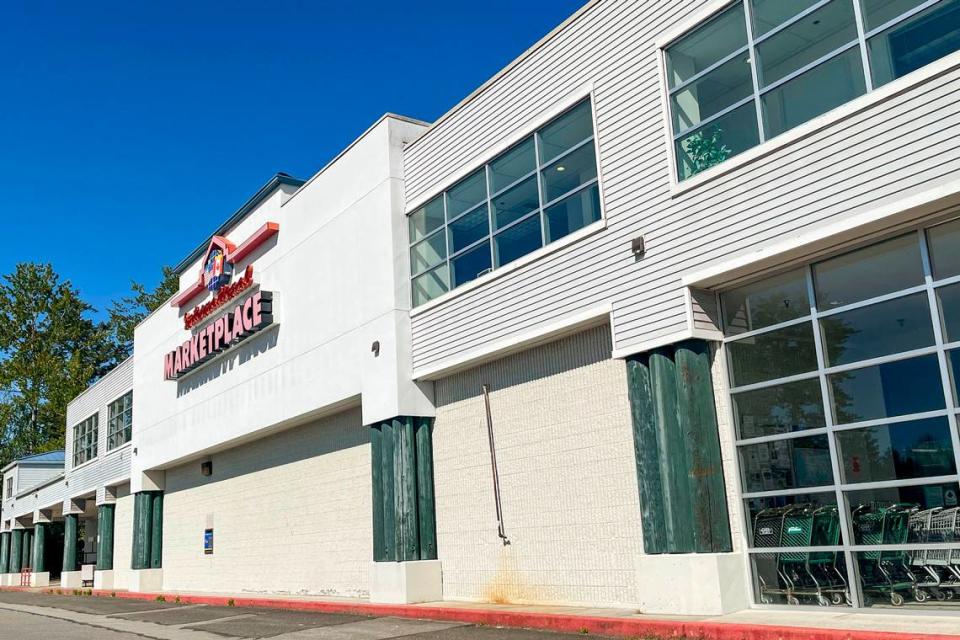Did COVID doom isolated WA town? State and federal leaders asked to help save it
- Oops!Something went wrong.Please try again later.
There’s no pharmacy in Point Roberts, Washington. There’s also no bus or taxi services, no veterinarian, no hospital, and no 24/7 police department.
The exclave of Washington state, which is in Whatcom County, is only accessible by driving 25 miles through the Canadian border from Blaine, Washington, and is home to about 1,200 residents in an approximate 5 square mile area.
Members of the community must travel between the borders for a lot of their needs from Point Roberts to Blaine, including some students for their daily commute to school. Some residents have dual citizenship and are able to use services, like a dentist, on the Canadian side of the border.
But when COVID lockdowns hit, the community suffered in ways that continue to be felt today. Although the border is now open, some members of the community say the town is still suffering, and that elected leaders need to have a plan in place before another catastrophe closes residents off from the mainland again.
Christopher Carleton, the town’s fire chief, told McClatchy he believed slow economic progress was the most lingering effect from the border closures, and that solutions need to be found to truly help the struggling community.
“I think it’s imperative to understand that if we don’t find a foundational solution and we are not put in writing at a congressional or senatorial level in both countries and governments, that this will happen again to our community,” said Carleton.
In 2021, Carleton wrote to Gov. Jay Inslee and other elected leaders and criticized what was then an ongoing border closure. Shortly after that email, Inslee used funds from the American Rescue Plan to provide $100,000 to save the Point Roberts grocery store and made a visit to the community.
Carleton doesn’t think that is enough.
“Necessities of life aren’t just a grocery store,” Carleton said. “but the value to have that freedom of travel due to our geographical isolation is imperative to our everyday life.”

Others in the community are feeling the impact of the economic situation in Point Roberts, and think that more relaxed borders would help.
Tamra Hansen is the owner of the Saltwater Cafe in Point Roberts. It is one of two restaurants in Point Roberts, but neither operate full time.
Hansen told McClatchy that the situation she finds her restaurant in is “challenging.”
She added that the “best year yet” for her cafe was in 2019, and that the restaurant is currently experiencing a 25-30% drop in business since then. She hopes to soon open and operate a currently-defunct restaurant at the marina in town in order to bring more tourism to the area.
Hansen said allowing Canadians with work visas to come to the area would benefit business owners like her as well.
Brian Calder is the chairman of the chamber of commerce in Point Roberts, and leads the school’s “dollars for scholars” program. His family has lived in Point Roberts for generations.
Like others, Calder feels Point Roberts has been left out of the economic recovery by federal and state leaders.
“The potential here is untapped,” Calder said.
In general, Calder said he believes Point Roberts is discriminated against by elected leaders who represent the area.
“If they paid any attention to us at all they would realize that it is imminently solvable for a reasonable price,” Calder said. “And they would benefit through increased taxation because of the volume of economic activity.”
Calder also agreed with others that having an agreement between the borders would be helpful for residents in the area to travel more freely and has expressed concerns to both the U.S. and Canadian governments multiple times. He has also been in communication with Whatcom County leaders and state officials regarding the issue, but said he feels like those conversations have not led to much action.

There was also an emotional aspect of the impacts COVID border closures had that some don’t want to see happen again.
Brian’s wife Marlene told McClatchy that it was difficult for her to be so restricted from seeing her family on the Canadian side, despite being a dual citizen. The emotional toll still has an effect on her, she said.
And the inconsistency of Canadian border patrol sometimes allowing passage and other times not was frustrating, as well as the pushback she would get from agents at the border.
“I haven’t gotten over it,” Marlene said.
Border crossing numbers also confirm what Calder and others told McClatchy: Point Roberts has seen a massive decline in visitors for the area.
While numbers were declining prior to COVID, the closures far exacerbated the issue. There are about 30,000 to 60,000 less border crossings on a monthly average than there were pre-COVID.
And, a fair share of those visitors are only coming over from Canada because gas prices are nearly a dollar cheaper in the exclave, Brian and others pointed out.
While McClatchy was in Point Roberts, researchers from the Border Policy Research Institute at Western Washington University were there to interview residents about all impacts of the border closures.
Dr. Laurie Trautman is the director of the program and said that other border areas researchers are studying, such as Windsor or Buffalo, aren’t affected by borders the same way as Point Roberts because it is completely isolated.
“This is a community that is completely dependent on a functioning border,” Trautman said. “And that was the real challenge was the border stopped functioning.”
Not only is there still personal trauma from people not being able to see family during those times, the economy is still suffering, she noted.
“Many, and if not most communities have recovered once those restrictions lifted–things went back to normal,” said Trautman. “Here, things didn’t go back to normal when restrictions ended.”
During the pandemic U.S. leaders such as Gov. Jay Inslee and congressional leaders heavily advocated for the community, but the Canadian government was not helpful, Trautman said.
“That breakdown in bilateral collaboration between the U.S. and Canada was really troubling,” she added. “And that is something we can work to do better next time.”
What leaders are saying
Sen. Sharon Shewmake, D-Bellingham, pushed back on the idea that all residents want to see more economic growth in Point Roberts. From talking to locals, she said there is a split between folks in the community who prefer the quiet of the area, and those who would like to see the area grow more economically. Shewmake acknowledged that the border closures were challenging for Point Roberts, however.
“It’s a challenging place to govern because the issues are hyperlocal,” Shewmake said. “You’ll hear disagreements between people and you don’t necessarily know which one represents the consensus.”
Others pointed out that the Legislature has already made some moves to help the small community.
Rep. Joe Timmons, D-Bellingham, noted that a bill sponsored by Shewmake this session, SB 6017, was passed to expand the use of the border area fuel tax.
Because Point Roberts isn’t connected to the continental U.S., the bill will “allow them to essentially expand the use of their border area fuel tax that they’re already collecting for transportation infrastructure,” Timmons said.
Timmons also pointed to funding provided by state lawmakers this year for broadband access, in addition to the nearly $12 million in funding provided by the federal government in 2022 to expand broadband in the area.
“Really in terms of how to help I am open to any and all specific ideas we can do to help the community there because I really want to see it thrive,” Timmons said.
In a statement from U.S. Senator Patty Murray, D-WA, she said that Point Roberts faces “unique hurdles” and that it is a really difficult situation. She also added that she “pushed hard and repeatedly” to reopen the border at Point Roberts during the pandemic.
“I support common-sense efforts to ensure people in Point Roberts and other enclave communities can move more easily across the border when they need to, especially when unforeseen circumstances like a pandemic make that much more difficult,” she said.
Prime Minister Justin Trudeau’s office did not respond to a request for comment about whether they had been contacted by residents and other elected officials, and instead referred McClatchy to the Canadian Border Services Agency.
“Cross-border travel that allowed individuals to access goods and services essential for work and daily life was permitted,” said a spokesperson for the agency. “Only in circumstances where the purpose of transiting through Canada was explicitly for optional purposes was prohibited. The Government of Canada applied the optional/discretionary purpose test to permit foreign nationals entry to Canada in order to transit directly to or from one point of the United States (U.S) to another point in the U.S. for reasons that would not be considered optional,” they said.
In an email from Mike Faulk, communications director for Inslee, he said that their office was in constant communication with the community “about their needs during and in the aftermath of the pandemic.”
“We wrote numerous letters to senior Cabinet officials, President Biden and his then-chief of staff, to say nothing of the efforts of the congressional delegation,” Faulk said. “To everyone’s frustration, we did not get much engagement with our persistent requests for modifications of the land border closure that lasted well into 2021.”
He noted that there is no question that the “unique geography creates unique challenges.”
“The state’s engagement here has been persistent and robust, within the bounds of what the state is empowered to do,” he said. “Potential future closures of the U.S.-Canada border or other ports of entry are exclusively the province of the federal and Canadian governments.”

